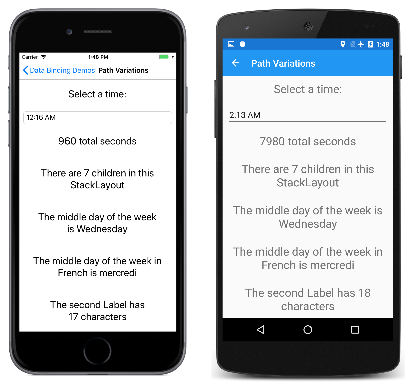Xamarin.Forms 바인딩 경로
이전의 모든 데이터 바인딩 예제에서 Binding 클래스의 Path 속성(또는 Binding 태그 확장의 Path 속성)을 단일 속성으로 설정했습니다. 실제로 Path를 하위 속성(속성의 속성) 또는 컬렉션의 멤버로 설정할 수 있습니다.
예를 들어 페이지에 TimePicker가 포함되었다고 가정합니다.
<TimePicker x:Name="timePicker">
TimePicker의 Time 속성은 TimeSpan형식이지만 TimeSpan 값의 TotalSeconds 속성을 참조하는 데이터 바인딩을 만드는 것이 좋습니다. 데이터 바인딩은 다음과 같습니다.
{Binding Source={x:Reference timePicker},
Path=Time.TotalSeconds}
Time 속성은 TimeSpan 형식이며 여기에는 TotalSeconds 속성이 포함됩니다. Time 및 TotalSeconds 속성은 마침표를 사용하여 간단히 연결됩니다. Path 문자열의 항목은 항상 이러한 속성의 형식이 아닌 속성을 가리킵니다.
예제 및 여러 기타 항목은 경로 변형 페이지에 표시됩니다.
<ContentPage xmlns="http://xamarin.com/schemas/2014/forms"
xmlns:x="http://schemas.microsoft.com/winfx/2009/xaml"
xmlns:globe="clr-namespace:System.Globalization;assembly=netstandard"
x:Class="DataBindingDemos.PathVariationsPage"
Title="Path Variations"
x:Name="page">
<ContentPage.Resources>
<ResourceDictionary>
<Style TargetType="Label">
<Setter Property="FontSize" Value="Large" />
<Setter Property="HorizontalTextAlignment" Value="Center" />
<Setter Property="VerticalOptions" Value="CenterAndExpand" />
</Style>
</ResourceDictionary>
</ContentPage.Resources>
<StackLayout Margin="10, 0">
<TimePicker x:Name="timePicker" />
<Label Text="{Binding Source={x:Reference timePicker},
Path=Time.TotalSeconds,
StringFormat='{0} total seconds'}" />
<Label Text="{Binding Source={x:Reference page},
Path=Content.Children.Count,
StringFormat='There are {0} children in this StackLayout'}" />
<Label Text="{Binding Source={x:Static globe:CultureInfo.CurrentCulture},
Path=DateTimeFormat.DayNames[3],
StringFormat='The middle day of the week is {0}'}" />
<Label>
<Label.Text>
<Binding Path="DateTimeFormat.DayNames[3]"
StringFormat="The middle day of the week in France is {0}">
<Binding.Source>
<globe:CultureInfo>
<x:Arguments>
<x:String>fr-FR</x:String>
</x:Arguments>
</globe:CultureInfo>
</Binding.Source>
</Binding>
</Label.Text>
</Label>
<Label Text="{Binding Source={x:Reference page},
Path=Content.Children[1].Text.Length,
StringFormat='The second Label has {0} characters'}" />
</StackLayout>
</ContentPage>
두 번째 Label에서 바인딩 소스는 페이지 자체입니다. Content 속성은 StackLayout 형식이고, 여기에는 IList<View> 형식의 Children 속성이 포함되고, 여기에는 자식의 수를 나타내는 Count 속성이 포함됩니다.
인덱서를 포함한 경로
경로 변형 페이지에 있는 세 번째 Label의 바인딩은 System.Globalization 네임스페이스에서 CultureInfo 클래스를 참조합니다.
<Label Text="{Binding Source={x:Static globe:CultureInfo.CurrentCulture},
Path=DateTimeFormat.DayNames[3],
StringFormat='The middle day of the week is {0}'}" />
원본은 CultureInfo 형식의 개체인 정적 CultureInfo.CurrentCulture 속성으로 설정됩니다. 클래스는 DayNames 컬렉션을 포함하는 DateTimeFormatInfo 형식의 DateTimeFormat이라는 속성을 정의합니다. 인덱스는 네 번째 항목을 선택합니다.
네 번째 Label은 이와 비슷하지만 프랑스와 관련된 문화권의 경우 사용됩니다. 바인딩의 Source 속성은 생성자를 포함한 CultureInfo 개체로 설정됩니다.
<Label>
<Label.Text>
<Binding Path="DateTimeFormat.DayNames[3]"
StringFormat="The middle day of the week in France is {0}">
<Binding.Source>
<globe:CultureInfo>
<x:Arguments>
<x:String>fr-FR</x:String>
</x:Arguments>
</globe:CultureInfo>
</Binding.Source>
</Binding>
</Label.Text>
</Label>
XAML에서 생성자 인수를 지정하는 방법에 대한 자세한 내용은 생성자 인수 전달을 참조하세요.
마지막으로, 마지막 예제는 StackLayout 자식 중 하나를 참조하는 점을 제외하고 두 번째 예제와 비슷합니다.
<Label Text="{Binding Source={x:Reference page},
Path=Content.Children[1].Text.Length,
StringFormat='The first Label has {0} characters'}" />
해당 자식은 Label이며 여기에는 String 형식의 Text 속성이 포함되고 여기에는 Length 속성이 포함됩니다. 첫 번째 Label은 TimePicker에 설정된 TimeSpan을 보고하므로 해당 텍스트가 변경되면 최종 Label도 변경됩니다.
실행 중인 프로그램은 다음과 같습니다.
복잡한 경로 디버그
복잡한 경로 정의는 생성하기 어려울 수 있습니다. 다음 하위 속성을 제대로 추가하기 위해 각 하위 속성의 형식이나 컬렉션의 항목 형식을 알아야 하지만 형식 자체는 경로에 표시되지 않습니다. 증분적으로 경로를 빌드하고 중간 결과를 확인하는 것이 좋습니다. 마지막 예제에서는 Path 정의 없이 시작할 수 있습니다.
<Label Text="{Binding Source={x:Reference page},
StringFormat='{0}'}" />
바인딩 소스의 형식 또는 DataBindingDemos.PathVariationsPage를 표시합니다. PathVariationsPage는 ContentPage에서 파생되므로 Content 속성이 포함됩니다.
<Label Text="{Binding Source={x:Reference page},
Path=Content,
StringFormat='{0}'}" />
Content 속성의 형식은 Xamarin.Forms.StackLayout이라고 표시됩니다. Children 속성을 Path에 추가하면 형식은 Xamarin.Forms.ElementCollection'1[Xamarin.Forms.View]입니다. 이것은 Xamarin.Forms에 대한 내부 클래스이지만 분명히 컬렉션 형식입니다. 여기에 인덱스를 추가하면 형식은 Xamarin.Forms.Label입니다. 이러한 방식으로 계속합니다.
Xamarin.Forms에서 바인딩 경로를 처리하면 경로의 개체에 PropertyChanged 처리기를 설치하여 INotifyPropertyChanged 인터페이스를 구현합니다. 예를 들어 Text 속성이 변경되기 때문에 마지막 바인딩은 첫 번째 Label의 변경 내용을 적용합니다.
바인딩 경로의 속성이 INotifyPropertyChanged를 구현하지 않는 경우 해당 속성에 대한 변경 내용이 무시됩니다. 일부 변경 내용이 바인딩 경로를 무효화할 수 있으므로 속성 및 하위 속성의 문자열이 잘못되지 않은 경우에만 이 기술을 사용해야 합니다.
